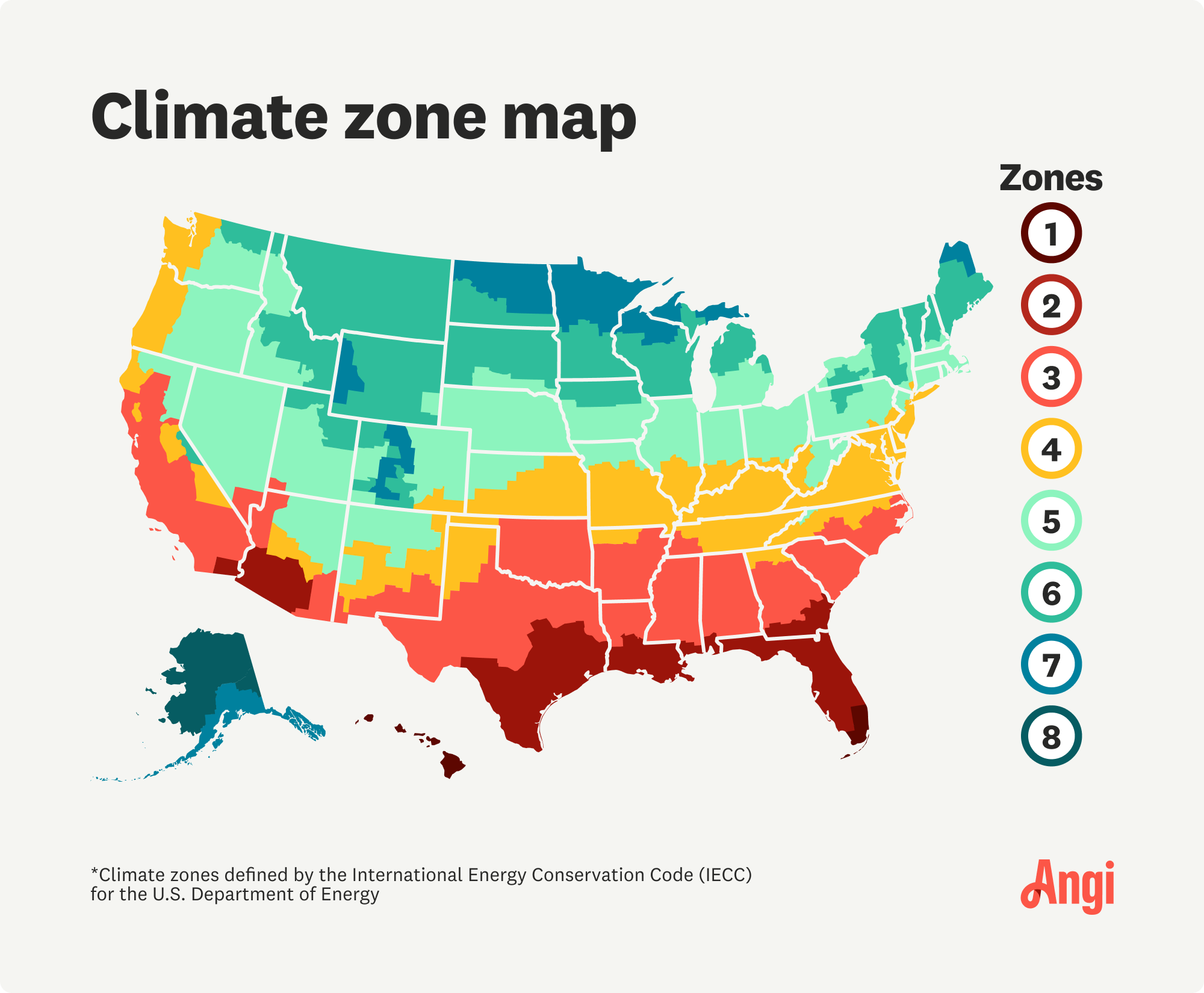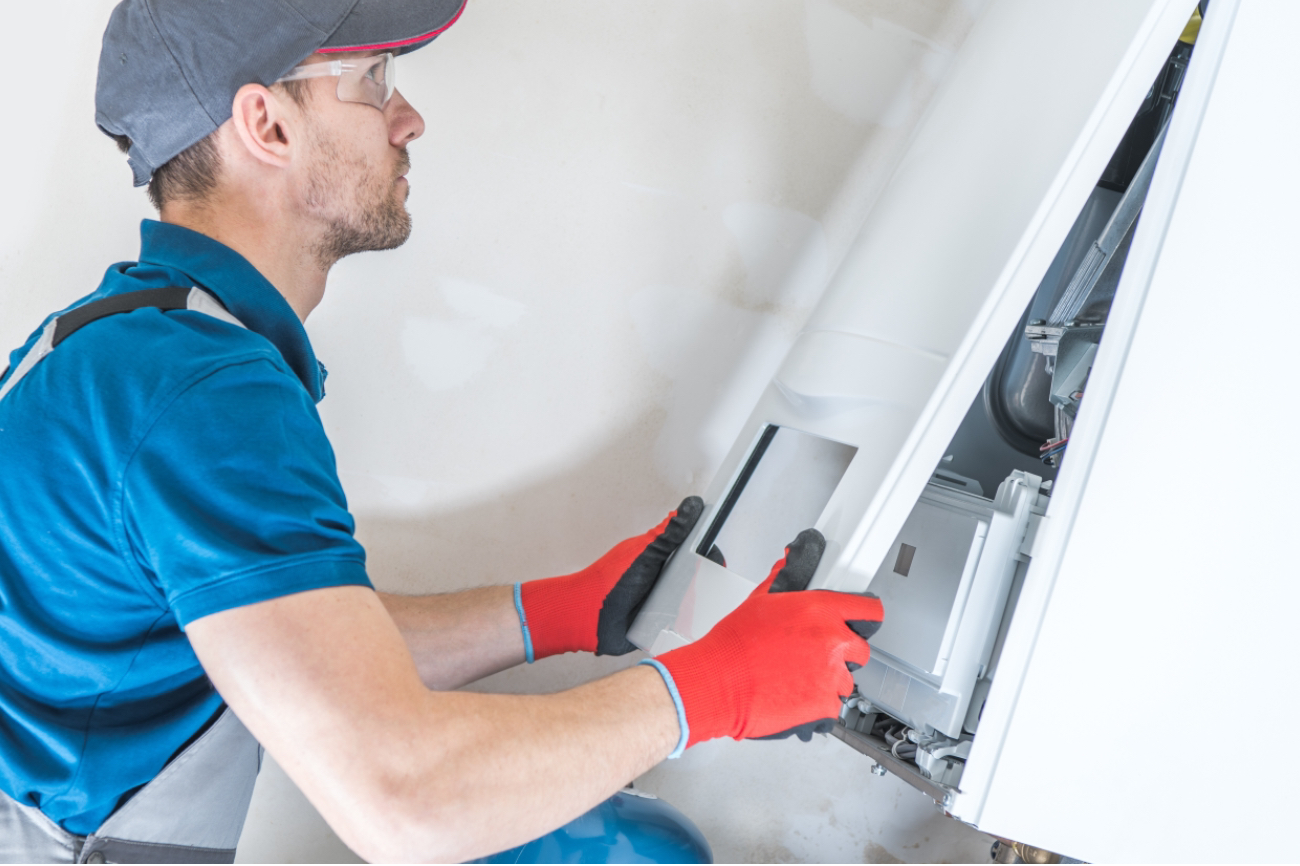
A faulty evaporator coil is a common cause of AC failure. But how much does an evaporator coil replacement cost? We explore the factors here.
Heating and air conditioning service costs depend on your project and location. Check with a local pro for your specific job.
The boiler capacity and fuel type will affect your replacement costs more than any other factor.
The average home in Orlando is 1,600 square feet and needs a boiler that’s between 50,000 and 60,000 BTUs.
Make sure you have a professional HVAC tech size your system because one that’s too big or too small for your home and climate can be problematic.
Electric boilers are some of the most common in Orlando due to their high efficiency and the low demand for heat in the hot climate.
Boiler replacement costs in Orlando average $5,908, and most projects total somewhere between $3,604 and $8,447. The capacity of the boiler in British Thermal Units (BTUs) and the fuel type you choose will affect your costs the most. Many residents can get away with boilers that are smaller than average due to the hot climate, and this can help bring costs even lower.
Boiler replacement costs in Orlando, FL, can fall as low as $580, but some homeowners pay as much as $12,000. There are a few factors to consider to get a better idea of what your total will be.
Getting the right size boiler ensures you have adequate heat to keep your home comfortable and safe but also to make sure it’s not oversized, which can cause it to run inefficiently.
Orlando falls in USDA climate zone 2, and a good rule of thumb in this hotter climate is to aim for 35 BTUs per square foot of living space, although this can vary based on many factors. The average home in Orlando is 1,600 square feet, which means the average boiler size is between 50,000 and 60,000 BTUs. This would cost between $4,800 and $6,200.
You can estimate the cost of your boiler by your home’s square footage and boiler capacity using the table below. However, call an HVAC pro in Orlando, FL, for the most accurate estimate.
| Home Size (Sq. Ft.) | BTUs Needed | Cost Range |
|---|---|---|
| 1,000 | 30,000–40,000 | $4,000–$6,000 |
| 1,200 | 40,000–45,000 | $4,200–$6,200 |
| 1,500 | 50,000–55,000 | $4,800–$6,600 |
| 1,600 | 50,000–60,000 | $4,800–$6,800 |
| 1,800 | 60,000–70,000 | $5,100–$7,000 |
| 2,000 | 65,000–75,000 | $5,300–$7,200 |
The most common fuel used for boilers in Orlando, FL, is electric. Gas and oil boilers are relatively uncommon, and propane is the more popular alternative to electric. The fuel type you choose will have a major impact on both your ongoing costs and how much you pay for a new boiler.
| Fuel Type | Cost Range |
|---|---|
| Electric | $1,800–$8,000 |
| Natural gas | $4,000–$9,000 |
| Oil | $4,800–$9,000 |
| Propane | $2,800–$7,500 |
| Wood | $7,000–$16,000 |
Oil boiler: Oil burns hotter than gas, so oil boilers provide the most heat. They’re uncommon in places like Orlando, where heating needs are minimal due to the hot climate. Oil boilers require more maintenance than gas options.
Gas and propane boiler: Propane and natural gas are common options for heating homes, although propane is far more popular in Orlando since gas service is limited in the city. In addition to the unit price, installation costs $1,000 to $3,000 and requires new exhaust lines, drains, and fuel lines.
Electric: Electric boilers are the most popular in Orlando. They’re highly efficient and don't require some of the components that gas and oil boilers need, like exhaust vents. They take a long time to heat up but are an attractive option in warm climates like Florida’s.
Wood: Large, outdoor, wood-fueled boilers are good options for rural areas that have easy access to wood. These are virtually non-existent in Orlando.
Boilers are broken out by fuel type, but they can also vary in other ways—like their system types.
| Boiler Type | Cost Range |
|---|---|
| Combination | $2,600–$7,000 |
| High-efficiency | $6,000–$11,000 |
| Standard | $2,200–$7,000 |
| System | $3,000–$6,000 |
Standard or conventional boilers: These boilers work by quickly heating water in pipes and sending it to your taps. Standard units are one of the most popular choices for homeowners in large homes and those with floor heating systems.
Combination boilers: Combination boilers are popular because they’ll give you access to hot water quickly. However, the supply tends to be limited due to the lack of a storage tank.
System boilers: These work by keeping high-pressure hot water in a sealed cylinder, where it can be sent to multiple taps within your home simultaneously.
High-efficiency boilers: High-efficiency boilers are up to 98% efficient, which accounts for thousands of dollars in savings over the boiler's life. Standard boilers are around 80% efficient, making them ideal for cold climates.

The capacity of your boiler (in BTUs) depends on your region and climate. Warmer climates make it much easier to heat water, even for larger houses, so fewer BTUs are required. You can estimate your necessary BTUs by finding out which climate zone you live in. Orlando falls within climate zone 2, which needs 35 BTUs per square foot of living space. The smaller boiler sizes for the minimal heating requirements in Orlando mean lower equipment costs.
The cost of living in Orlando is more than 7% higher than the national average, which means labor costs will be higher than you’d see in most other cities. Around 50% of your total will go toward labor when it’s time to replace a boiler, which means you’ll pay an average of $2,950 for labor alone when you hire an HVAC pro in Orlando.
The City of Orlando requires certified professionals to complete work on mechanical systems, including HVAC equipment and boilers. Orlando also requires a permit for boiler replacement. The city charges a $38 base fee for the first $1,000 worth of work plus $10 per additional $1,000 worth of work. Given the average boiler replacement cost in Orlando, your permit fee will add an average of $96.
Yes, replacing your boiler will increase home value. The average return on investment (ROI) for boiler replacement is between 50% and 80%, which means a value increase of between $2,900 and $4,700. You’ll see the highest ROI if you install an electric boiler, which will conform to neighborhood standards in Orlando and provide buyers with the lowest maintenance costs possible.
Home is the most important place on earth, which is why Angi has helped more than 150 million homeowners transform their houses into homes they adore. To help homeowners with their next project, Angi provides readers with the most accurate cost data and upholds strict editorial standards. We’ve surveyed thousands of real Angi customers about their project costs to develop the pricing data you see, so you can make the best decisions for you and your home. We pair this data with research from reputable sources, including the U.S. Bureau of Labor Statistics, academic journals, market studies, and interviews with industry experts—all to ensure our prices reflect real-world projects.
Want to help us improve our cost data? Send us a recent project quote to [email protected]. Quotes and personal information will not be shared publicly.
From average costs to expert advice, get all the answers you need to get your job done.

A faulty evaporator coil is a common cause of AC failure. But how much does an evaporator coil replacement cost? We explore the factors here.

Exposed ductwork can be a smart choice even beyond aesthetics. Fortunately, exposed ductwork costs are relatively low, and easy access keeps repair costs to a minimum.

The cost of boiler repair depends on the specific issue. Read our expert guide, which breaks down boiler service costs so you can budget accordingly.

Baseboard heater covers can endure a lot of wear and tear, but eventually you’ll want to replace them. Here’s the best way to switch out baseboard heater covers.

Do you have a clogged AC drain line? We dig into the reasons behind those pesky blockages and how to clear them for optimal AC performance.

Discover heat exchanger replacement costs to learn about price factors, labor, and ways to save before hiring a pro or starting your project.